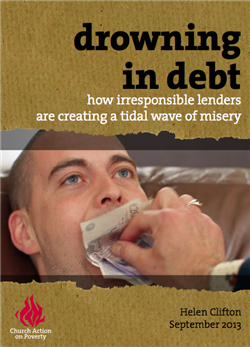Drowning in Debt: call for tighter regulation of high-cost lending
Low-income customers are being charged up to six times the retail cost of furniture by the booming rent-to-own sector

A campaigning Christian charity has called for urgent reform to the whole high-cost credit market after publishing a report which shows the industry has more than doubled profits since 2009
Drowning in Debt, a report published this week by Church Action on Poverty and the Centre for Responsible Credit, has revealed that the rent-to-own (RTO) sector has more than doubled its pre-tax profits over the last three years, from £9.83 million to £19.7 million. It has done this by selling basic appliances, furniture, and white goods to hard-up families at inflated prices with interest rates of almost 70 per cent.
People who rely on benefits, without savings, on a low income or with a bad credit history are reliant on the RTO and high cost credit sector to equip their homes.
The charities are now urging the Financial Conduct Authority (FCA) to use their new powers to enforce firm limits on what the high cost credit sector can charge. They say the FCA also needs to ensure that lenders share the data that will enable customers to get affordable credit. Otherwise, the charities say, millions more will needlessly sink further into debt.
Niall Cooper, National Coordinator at Church Action on Poverty, said:
'Against this backdrop of enormous profits and expanding markets, the people who are fuelling this boom continue to struggle with rising living costs. And as millions of people struggle to access cheaper bank loans and credit cards, many are left with nowhere to turn.
'It is crucial that the Financial Conduct Authority (FCA) use their new powers to enforce firm limits on what the high-cost credit sector can charge. They also need to ensure that lenders share the data that will enable customers to get affordable credit. Otherwise, millions more will needlessly sink further into debt.'
Payment plans spread over years make prices seem affordable, say the charities in the report. But a six-seater sofa bought from BrightHouse on a payment plan of £26 a week for 156 weeks at 64.7 per cent interest costs £4,056.00 – while the equivalent item from Sofaland costs just £660. A Hotpoint 7kg washing machine on a payment plan of £6 a week for 156 weeks at 64.7 per cent costs £936.00. The equivalent item from Appliances Online costs just £235.
What's more, the number of RTO shops across the country has roughly doubled since the recession began, from 179 in 2008 to 344 now. The charities' analysis of store locations shows that they are overwhelmingly located in the poorest communities across the UK. 62 per cent of PerfectHomes stores and 48 per cent of Brighthouse stores are located in the poorest 10 per cent of neighbourhoods in England.
By contrast the recession is forcing mainstream retailers to shut down their stores, with electronics giant Dixons planning to close 60 shops as losses continue.
Taking out doorstep loans and using rent-to-own companies left mum-of-five Donna Allison, 28, of Thornaby, with large debts. But with help from Church Action on Poverty's partner organisation Thrive, Donna has managed to pay off most of her loans, and is now a money mentor.
'Everyone I know has doorstep lenders - family, friends,' she said. 'They also use rent-to-own. You don’t have the money to save when you’ve got children or you’re on benefits so you go to these places. But then you’re paying a thousand pounds for a second-hand washer.
'I had bailiffs coming to the door, and red letters all the time. I was scared to answer the phone. I was getting depressed. They threatened to come and take my goods from me if I didn’t pay. I was frightened. They keep asking me if I would like another loan. But now I’m strong, and say no.'
Thrive and the Centre for Responsible Credit have successfully negotiated with RTO leaders BrightHouse, PerfectHome and Buy As You View to secure a number of important reforms that include a commitment to data sharing, lower default charges, lower interest rates of 24.9 per cent, more flexible payment options, and independent debt advice.
But the Government continues to reject calls for a cap on the interest rates that firms can charge borrowers.
Church Action on Poverty are calling on the FCA to ensure that:
Nobody should ever have to use more than a third of their gross income to repay high-cost lenders;
Lenders should share data so that they can check borrowers' income and other commitments before lending;
Lenders who break these rules lose their licences.
The total UK high-cost credit sector – which also includes payday and doorstep loans - is now worth more than £7.5 billion.